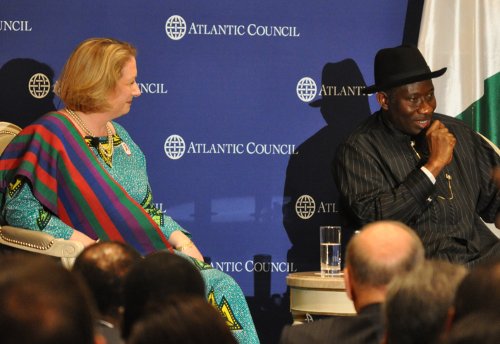
“Clean!” was Nigerian Acting President Goodluck Jonathan’s emphatic response when asked for a promise about the upcoming 2011 elections.
At the formal launch of the Atlantic Council’s Ansari Africa Center, Dr. Jonathan spoke to a standing room only crowd about his vision for good governance and accountability, youth and hope, peace and security. The speech ranged widely and was notable for its candor and forward-looking character. The Acting President emphasized the vital connection between Nigeria’s much-needed internal stability and its ability to be a strong partner in building a peaceful international order. He noted the loss of Nigerian blood and treasure in past interventions to stop civil wars in Liberia and Sierra Leone and dared the audience to imagine how much more could be achieved in its role as a regional power by a peaceful Nigeria.
Dr. Jonathan suggested that this ability to act for the good of neighbors and friends drew from a deep well of empathy Nigerians have for others, having themselves suffered grievously from political violence and authoritarianism. It was this empathy that prompted Nigerians to stand with the United States following the attacks of 9/11 and that ensures that terrorists will not find a haven in Nigeria today. Dr. Jonathan expressed regret that the United States had for a time placed Nigeria on a terrorist watch list. But he was glad that officials in Washington had changed the criteria for airport screening and that the concerns of the Nigerian government had been properly taken into account at the highest levels.
He spoke urgently of this being a moment in history when leaders in Nigeria should stand tall and be accountable for the security of Nigerians’ lives, dignity and property, as well as their need for a growing, sustainable economy. It is only when these goals are sought zealously that a prolonged peace will reign in parts of Nigeria such as the Niger Delta, where poverty and the loss of livelihood due to environmental degradation have spawned a culture of disaffection.
Noting the tragedy of the recent violence in Jos, Dr. Jonathan rejected the analysis, seen in some newspaper headlines, that Nigeria is in the midst of a religious war. He explained that in a period of intensified competition over resources — worldwide and not just in Nigeria — when violence is unleashed, it takes on different social and organizational forms. He reiterated that just as economic development and a wider distribution of opportunity and the public good is crucial to peace in the Niger Delta, the same is the case in Jos.
Acknowledging that the key to ensuring needed reforms is improved governance, the Acting President was candid in connecting this to the holding of free and fair elections. These are what would ensure the credibility of officials. In his formal remarks and later during the question and answer session, he was unequivocal in promising a reformed electoral system that will deliver a ‘clean’ election next year. This was the second time in as many days that he had made detailed reference to the critical importance that next year’s elections meet a high standard of fairness.
Martin Kimani is deputy director of the Atlantic Council’s Ansari Africa Center.
